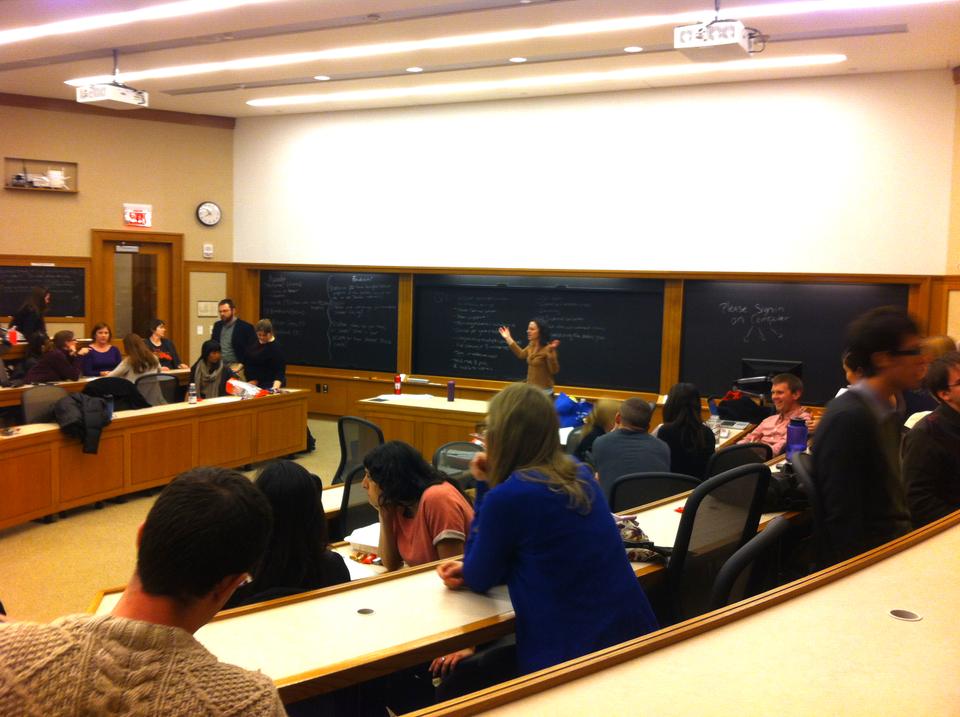
News
Harvard Quietly Resolves Anti-Palestinian Discrimination Complaint With Ed. Department

News
Following Dining Hall Crowds, Harvard College Won’t Say Whether It Tracked Wintersession Move-Ins

News
Harvard Outsources Program to Identify Descendants of Those Enslaved by University Affiliates, Lays Off Internal Staff

News
Harvard Medical School Cancels Class Session With Gazan Patients, Calling It One-Sided

News
Garber Privately Tells Faculty That Harvard Must Rethink Messaging After GOP Victory
Law School Coalition Aims To Mitigate Campus Gender Disparities

In response to statistics revealing gender skew in Harvard Law School clubs and classrooms, a new coalition called Shatter the Ceiling has drawn hundreds of students together to seek new ways to address the School’s gender disparities.
Over 275 students attended the organization’s kick-off event earlier this month, and a solidarity letter outlining the coalition’s goals has garnered approximately 300 signatures. Signers include Law School professors Robert H. Mnookin and Duncan Kennedy as well as several clubs such as the Democrats, the American Constitution Society, and the Harvard Association for Law and Business.
The primary goal of the coalition is to engage the entire Law School community to question the source of the disparities and find solutions to mitigate them, said Lena M. Silver, a third-year Law School student and the co-chair of Shatter the Ceiling.
In an opinion piece published in the Harvard Law Record, Silver cited several statistics that prompted her to found the coalition. She noted that female faculty members represent less than 20 percent of the 92 current professors and assistant professors listed on the Law School website. She also cited the low number of female staff members at the Harvard Law Review, which spurred a new gender-based affirmative action policy to be implemented at the journal this summer.
First-year Law School student Jessica R. Jensen, who attended the coalition’s first open meeting on Wednesday night, said she has noticed a large gender disparity on campus.
“It seems like there are a lot of clubs that have a very large percentage of male leadership, especially in law journals and organizations that lead into academia, which is already a very male dominated field,” Jensen said.
The coalition’s leaders hope to gain access to more data in an attempt to identify the source of the issue. In particular, they want to obtain an update on old numbers cited in a 2004 study on the experiences of women at Law School.
“We feel like we have a right to it, and we will work hard to get it,” Silver said.
At this point in time, coalition leaders have made no concrete demands on administrators because they are still developing their plan, Silver said.
At Wednesday’s meeting, attendees discussed the possibility of asking for a change in the way that first-year Law School students are assigned professors. Currently, the Law School Registrar’s Office tries to assign all students to at least one class taught by a female faculty member during their first year at the Law School, according to Ellen M. Cosgrove, dean of students at the Law School. But the coalition hopes to pressure administrators to ensure that this exposure to a female faculty member occurs even earlier—during a student’s first semester at the Law School.
Attendees also proposed asking administrators to conduct a study examining the effect of gender on classroom participation.
Cosgrove said that she is “delighted” by the group’s establishment and is willing to discuss ways of working together.
“Regardless of whether or not the group exists, it’s something the School is always mindful of and thinks about when we’re making any sort of plans,” Cosgrove said.
Second-year Law School student Jean N. Ripley, the other co-chair of the coalition, said that although the general reaction to the new organization has been positive, it has spurred debate on campus.
“Having backlash is better than being ignored,” she said.
—Staff writer Dev A. Patel can be reached at devpatel@college.harvard.edu. Follow him on Twitter @dev_a_patel.
Want to keep up with breaking news? Subscribe to our email newsletter.
